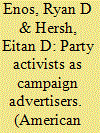| Srl | Item |
| 1 |
ID:
168536


|
|
|
|
|
| Summary/Abstract |
Violent protests are dramatic political events, yet we know little about the effect of these events on political behavior. While scholars typically treat violent protests as deliberate acts undertaken in pursuit of specific goals, due to a lack of appropriate data and difficulty in causal identification, there is scant evidence of whether riots can actually increase support for these goals. Using geocoded data, we analyze measures of policy support before and after the 1992 Los Angeles riot—one of the most high-profile events of political violence in recent American history—that occurred just prior to an election. Contrary to some expectations from the academic literature and the popular press, we find that the riot caused a marked liberal shift in policy support at the polls. Investigating the sources of this shift, we find that it was likely the result of increased mobilization of both African American and white voters. Remarkably, this mobilization endures over a decade later.
|
|
|
|
|
|
|
|
|
|
|
|
|
|
|
|
| 2 |
ID:
162207


|
|
|
|
|
| Summary/Abstract |
It is well-established that in diverse societies, certain groups prefer to exclude other groups from power and often from society entirely. Yet as many societies are diversifying at an increasingly rapid pace, the need for cross-group cooperation to solve collective action problems has intensified. Do preferences for exclusion inhibit the ability of individuals to cooperate and, therefore, diminish the ability for societies to collectively provide public goods? Turning to Israel, a society with multiple overlapping and politically salient cleavages, we use a large-scale lab-in-the-field design to investigate how preferences for exclusion among the Jewish majority predict discriminatory behavior toward Palestinian Citizens of Israel. We establish that preferences for exclusion are likely symbolic attitudes, and therefore stable and dominating of other attitudes; are held especially strongly by low-status majority group members; and powerfully predict costly non-cooperation. This preferences/behavior relationship appears unaffected by mitigating factors proposed in the intergroup relations literature. The demonstrated influence of symbolic attitudes on behavior calls for further examination of the social roots of exclusionary preferences.
|
|
|
|
|
|
|
|
|
|
|
|
|
|
|
|
| 3 |
ID:
140171


|
|
|
|
|
| Summary/Abstract |
As a key element of their strategy, recent Presidential campaigns have recruited thousands of workers to engage in direct voter contact. We conceive of this strategy as a principal-agent problem. Workers engaged in direct contact are intermediaries between candidates and voters, but they may be ill-suited to convey messages to general-election audiences. By analyzing a survey of workers fielded in partnership with the 2012 Obama campaign, we show that in the context of the campaign widely considered most adept at direct contact, individuals who were interacting with swing voters on the campaign’s behalf were demographically unrepresentative, ideologically extreme, cared about atypical issues, and misunderstood the voters’ priorities. We find little evidence that the campaign was able to use strategies of agent control to mitigate its principal-agent problem. We question whether individuals typically willing to be volunteer surrogates are productive agents for a strategic campaign.
|
|
|
|
|
|
|
|
|
|
|
|
|
|
|
|